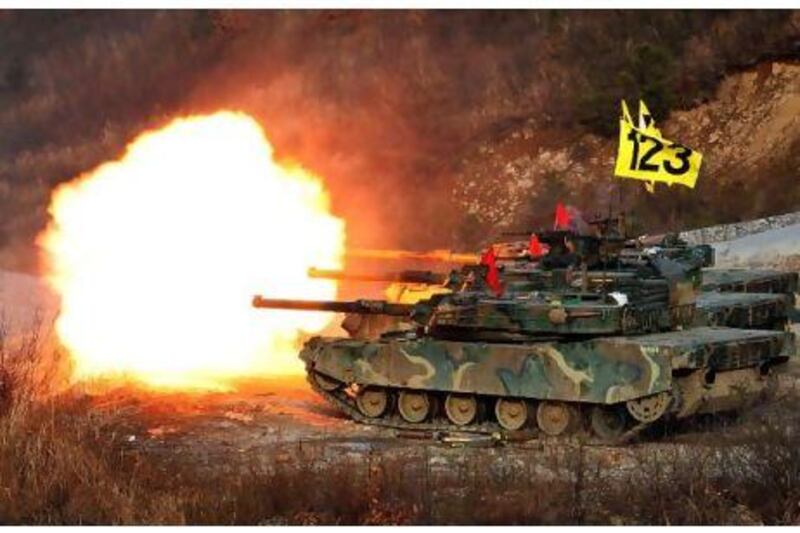BEIJING // North Korea yesterday warned it was prepared to wage a nuclear "sacred war" on its southern neighbour, as Seoul held military exercises analysts said were designed more to impress the domestic audience than to frighten Pyongyang.
The North Korean armed forces minister, Kim Yong-chun, reaffirmed Pyongyang's nuclear capabilities while reading a report at a meeting in the capital yesterday, and said the country could engage in conflict "at any time".
While extreme even by the standards of North Korea, the comments come in the context of repeated threats from the north, including warnings just a few days ago in the run-up to a previous round of military exercises.
"The revolutionary armed forces of [North Korea] are getting fully prepared to launch a sacred war of justice of Korean style based on the nuclear deterrent at any time necessary to cope with the enemies' actions deliberately pushing the situation to the brink of a war," Mr Kim was quoted by the official North Korean news agency as saying.
His words came as South Korea staged war games about 20 kilometres from the border between the two countries, with 800 troops, tanks, fighter jets and rocket launchers involved. Fiery explosions lit up the mountainside training ground.
Officials described the live-fire drills as the country's largest ever on land during the winter, as separate maritime military exercises begun earlier continued.
The South Korean president, Lee Myung-bak, visited frontline troops himself yesterday, three years from being elected on a platform of taking a tougher line with North Korea. Dressed in camouflage gear, he surveyed the landscape at a guard post near North Korea.
Anger has flared in South Korea in recent weeks over what many saw as a muted response from Seoul to North Korea's shelling last month of Yeonpyeong island in which four people were killed and neighbourhoods razed.
Comments from Mr Lee yesterday published by the official Yonhap news agency indicated his desire to keep a lid on domestic anger.
"We can prevent [the North] from taking provocative acts through strong unity together with powerful response," he said.
Before Mr Kim made his comments, tensions on the peninsula had appeared to calm, after Pyongyang failed to respond militarily to exercises staged on Monday by South Korea at Yeonpyeong island.
Joseph Cheng, a professor of political science at the City University of Hong Kong, said yesterday's South Korean drills were "largely posturing for the domestic audience".
"The president would like to be seen to be strong in dealing with Pyongyang," he said. "In his election campaign, he certainly criticised his predecessor for being too weak, for having no principles in dealing with Pyongyang."
Since the bombardment of Yeonpyeong a month ago, in a further effort to toughen his stance, Mr Lee replaced his defence minister with a more hardline former joint chiefs of staff chairman who has promised air strikes if North Korea launches another attack.
China and Russia have however expressed concerns South Korea's recent more assertive stance could stoke tensions.
As well as the Yeonpyeong bombardment, North Korea has been blamed for the sinking in March of a South Korean naval corvette, the Cheonan, with the loss of 46 lives. Pyongyang denied responsibility.
Mr Cheng, who spoke before the "sacred war" threats were made yesterday evening local time, said there was still a chance North Korea could launch another attack on its southern neighbour in the near future.
"It's possible...it wants to bolster its negotiating position and in the coming months the food shortages will become more acute just before the harvest," he said.
North Korea has previously secured pledges of food aid on the back of promises over its nuclear programme. Six-party talks on the nuclear issue have been stalled since last year, although this week Pyongyang's ally, China, repeated calls for them to restart.
Bill Richardson, the New Mexico governor and a former US ambassador to the United Nations, completed a visit to Pyongyang this week and said he had secured a promise from the communist regime for the International Atomic Energy Agency to return to the country, news greeted coolly by Washington.
Last month, the existence in North Korea of a uranium-enrichment facility, a potential source of material for nuclear weapons, was revealed by a US scientist.






